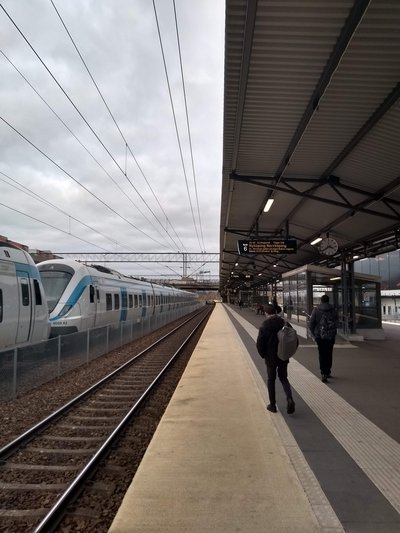Workplace challenges in a shifting world
Working with migrants can challenge the usual expectations and routines of the workforce in welfare institutions. Bureaucrats respond differently depending on their own background and they can resort to different coping strategies, such as, ‘othering’ their migrant clients. Organizational pressures such as integrating new public management processes add to these challenges and can result in existential insecurity amongst bureaucrats; their ontological security is challenged which can have a knock-on effect on their work, that of the institutions they work for and outcomes for their migrant clients.

Until recently, Sweden was known as one of the most welcoming countries to refugees, a phenomenon also known as “Swedish exceptionalism”. However, the year 2015 marked a drastic change in Sweden’s progressive approach to migration. The country experienced a short, intense period of substantially higher immigration due to the increase in numbers of asylum seekers, the largest increase in Europe in fact. Among other things, this short migration inflow was decisive in changing the conversation in Sweden around immigration, from positive to more negative. Against this background, it is useful to ask how bureaucrats working in welfare state institutions cope with the recent changes, especially those that came in the wake of significant migration to Sweden in 2015, and whether this has had consequences for how they carry out their work.
Ontological insecurity: A useful concept
The concept of ontological security captures the existential dimension of feeling safe in society, which stands in contrast to feeling ontologically insecure (for more on this, see Giddens, 2006). In political and public debates migrants are often portrayed as a security threat and are repeatedly positioned as the scapegoats of a variety of societal transformations and challenges. This can have a knock-on effect in the workplace. Ontological security is, however, rarely looked at from an organisational or professional perspective.
The ontologically secure individual has trust in their everyday life and the surrounding world with no fear of its form changing. Everyday routines shape an individual’s ontological security. A feeling of belonging is important for shaping predictability and in turn ontological security. However, well-functioning routines can be disturbed by “critical situations” that threaten, for example, our sense of national belonging and consequently our ontological security (Croft, 2012). National as well as other forms of identity-building can offer a reliable way of making sense of the world and positioning oneself in relation to ‘others’. To overcome feelings of insecurity, nationalism can provide powerful stories to “convey a picture of security and simple answers” (Kinnvall, 2004, p.763). As a reaction to uncertainty and existential anxiety, individuals might respond through different (identity) strategies that help them to cope. These strategies can be used to understand how bureaucrats respond to structural transformations inside and outside their workplace, as well as responses to working with different clientele.
Ontological insecurity in a shifting world
The fears and anxieties of individuals and how these are dealt with are relatively well-documented, but it is useful to integrate an organisational perspective when understanding bureaucrats' work life. Focusing on coping mechanisms in the form of (identity) strategies found in the ontological security literature, while also looking at organisational processes, offers a more complex understanding of bureaucrats’ uncertainties in their work life.

PICTURE: Sweden experienced the largest increase of immigration in Europe during the 2015 refugee crisis. Photo: Norrköping Station, Sweden.
Professionals in organisations are socialised into routines and an interruption to these can cause a disturbance in their ontological security. Work with migrants can, in one sense, act as a kind of disturbance to the usual way of working with clients from the majority population. This can constitute an additional burden for workers at welfare institutions, and even challenge their perceptions of themselves and how they work. Generally, increased anxiety for bureaucrats in this context might be due to three main factors:
- a generally negative migration discourse;
- the implementation of New Public Management (NPM) in the form of demanding faster and more cost effective services; and,
- uncertainty in their work with migrants as it is often more complex in different kinds of ways.
Here, the interplay between 2 and 3 above is crucial; experiencing performance pressure due to NPM might be conveyed in feeling anxious due to working with migrants, and can lead to migrants being blamed for the anxieties resulting from performance pressure.
Swedish welfare organisations and their clients
In 2016, 1319 staff members at two different welfare organisations responded to an open-ended survey questionnaire. The bureaucrats worked at the Public Employment Services and Social Insurance Agency. They expressed different strategies to maintain their ontological security and these were reflected in several key themes that came out in the analysis.
The survey results reflected a general dissatisfaction with the system as it stands. Among some, this manifested itself in a wish for more adequate societal responses to achieve better conditions for integrating migrants. Bureaucrats also expressed feeling the pressure to perform under increased time constraints, something which can also result in increased ontological insecurity. The already challenging emotional work is thereby impeded by performance pressure and previous studies have shown that this might result in strategies which involve distancing and avoidance techniques, that is, the bureaucrats might simply engage less with their clients (see, for example, Ashman & Gibson, 2010).

PICTURE: Working with migrants is often more complex than working with the majority population, and can lead to worker insecurity. Photo: Colourbox.com.
Potential coping strategies
The need to learn more about ‘different cultures’ in order to have better encounters with migrants at work was also expressed clearly in the survey results. The demand for competency in dealing with clients of different cultures (cultural competence) is seen as a simple solution to overcoming the complexities of interacting with migrants at the micro-level, and thereby reducing the insecurity that is perceived as challenging in the workplace. The desire for cultural competence indicates the need to make sense of oneself in a professional role by being able to predict what to expect when interacting with migrants. Acquiring greater cultural competence would allow bureaucrats to be able to regain ontological security by developing routines and having certain expectations from their work, expectations that were interrupted by the anxiety of not really knowing how to work with migrants.
In contrast, expressions emerged showing the debasement of migrants and their conversion into ‘the enemy’, which might be a strategy to secure one’s ‘self’. Part of reaching ontological security is a process of “building walls of … security around the self” by decreasing factors of ambiguity that jeopardise the sense of safety required in order to reduce existential anxiety (Kinnvall & Nesbitt-Larking, 2011, p. 57). The drive to feel ontologically secure can be satisfied by identifying a threat – here migrants in Swedish society – in order to become more ontologically secure. This approach clearly might have severe consequences for the ‘other’ due to the risk of highly exclusionary processes that, in turn, might lead to ontological insecurity for the ‘other’.
Bureaucrats belonging to a minority group expressed concerns about racism in society at large but also in their workplace. Their responses suggest that feelings of belonging and security are hampered by discrimination within the organisations they work for. These bureaucrats not only have to deal with the usual work struggles, but are also confronted with an additional burden through feelings of alienation.
Understanding expressions of ontological insecurity
The different strategies put forward by the bureaucrats who responded to the survey can be useful and confirm how ontological insecurity influences bureaucrats’ work with migrants and their perceptions about migrants and migration. Bureaucrats are influenced by both internal organisational changes and external changes linked to wider societal issues. Internal processes on the organisational level are often characterised by New Public Management processes in the form of, for example, monitoring and time constraints, while external processes are marked by the public discourse around migration. Together these can lead to a sense of loss of control and a loss of a sense of collective security. This leads to increased insecurity among bureaucrats and might push them into a variety of identity strategies in order to counter-balance feelings of uncertainty.
This article is based on a recently published article called ‘Ontological Security in Times of Global Transformations? Bureaucrats’ Perceptions on Organizational Work Life and Migration’ by the same author in the journal Political Psychology. The academic article also received the Reimagining Norden in an Evolving World early career paper prize in 2019.
Further reading:
- Anthony Giddens, Modernity and self-identity: Self and society in the late modern age (Stanford, CA: Stanford University Press, 2006).
- Brent J. Steele, 'Organizational processes and ontological (in)security: Torture, the CIA and the United States'. Cooperation and Conflict, 52, 1 (2017), pp. 69–89.
- Carolin Schütze, 'Ontological Security in Times of Global Transformations? Bureaucrats' Perceptions on Organizational Work Life and Migration'. Political Psychology (2021).
- Catarina Kinnvall, 'Globalization and religious nationalism: Self, identity, and the search for ontological security'. Political Psychology, 25, 5 (2004), pp. 741–767.
- Catarina Kinnvall & Paul Nesbitt-Larking, The political psychology of globalization: Muslims in the West (Oxford: Oxford University Press, 2011).
- Ian Ashman, & Caroline Gibson, 'Existential identity, ontological insecurity and mental well-being in the workplace'. Contemporary Readings in Law and Social Justice, 2, 2 (2010), p. 126.
- Kate Botterill, Peter Hopkins & Gurchathen Singh Sanghera, 'Young people’s everyday securities: Pre-emptive and pro-active strategies towards ontological security in Scotland'. Social & Cultural Geography, 20, 4 (2019), pp. 465–484.
- Stuart Croft, Securitizing Islam: Identity and the search for security (New York, NY. Cambridge University Press, 2012).